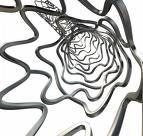
January 25, 2010 – Trials for a stent that attracts endothelial progenitor cells show positive results in patients with bifurcation lesions and those with non-ST-segment elevation acute coronary syndrome.
OrbusNeich announced the clinical data at Asia PCR/Singapore LIVE 2010, demonstrating the benefits of the Genous Bio-Engineered R Stent in the treatment of two challenging patient subsets. The stent uses endothelial progenitor cell (EPC) capture technology to promote rapid healing of the vessel and to prevent neointimal hyperplasia.
Professor Robbert de Winter, M.D., Ph.D., of the Academic Medical Center (AMC) in Amsterdam, presented "One Year Clinical Outcome after Provisional T Stenting with the Endothelial Progenitor Cell Capturing Stent for Bifurcation Lesions." The information featured a single-center study with 178 patients that compared the Genous Bio-Engineered R Stent to a previous bare metal stent control group of 465 patients at the AMC. A 32 percent reduction of the composite of cardiac death, myocardial infarction or target lesion revascularization was reported between these two groups. The cumulative rate of definite or probable stent thrombosis was reduced by 57 percent in the Genous stent-treated group compared to the control group.
"Bifurcation lesions remain a challenge for interventional cardiologists," said Dr. de Winter said. "The Genous Bio-Engineered R Stent, with a low rate of stent thrombosis, is an alternative for this challenging patient group."
Wojciech Wojakowski, M.D., from Medical University of Silesia, Poland, presented data on the JACK-EPC trial. The trial compared the efficiency of high-dose atorvastatin and endothelial progenitor-capture stents versus bare metal stents, in the reduction of neointimal formation in patients with non-ST-segment elevation acute coronary syndrome (NSTE-ACS). The randomized study with 60 patients compared the Genous with bare metal stents with concomitant high-dose atorvastatin in the reduction of neointimal hyperplasia assessed by coronary angiography and IVUS after six months.
In the JACK-EPC trial, the Genous stent induced less neointimal hyperplasia and a lower binary restenosis rate of 13 percent, compared to 26.6 percent in the control group. The major adverse cardiac events (MACE) rate was reported at only 10 percent in the Genous treated patient group versus 16 percent in the bare metal stent treated group.
"In our small study, we observed a lower amount of neointimal proliferation with the EPC capture stent compared to the bare metal stent control," said Dr. Wojakowski. "Good safety is indicated by comparable stent thrombosis. We think this makes the Genous stent a very promising treatment strategy for ACS patients, especially those with high risk of bleeding or not eligible for prolonged dual antiplatelet therapy due to allergy to ASA or clopidogrel."
For more information: www.orbusneich.com


 January 05, 2026
January 05, 2026 









